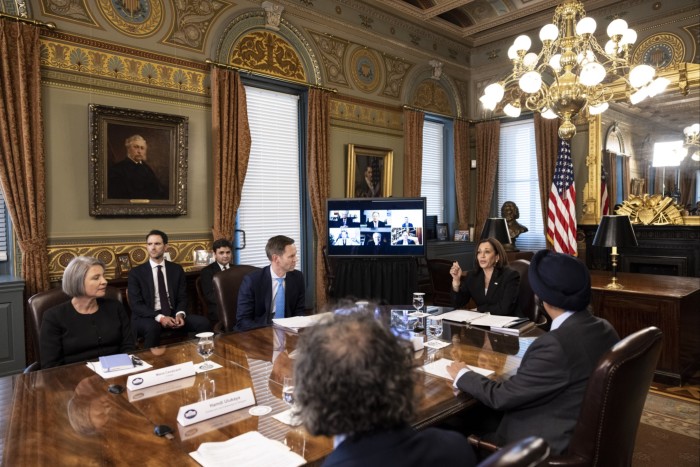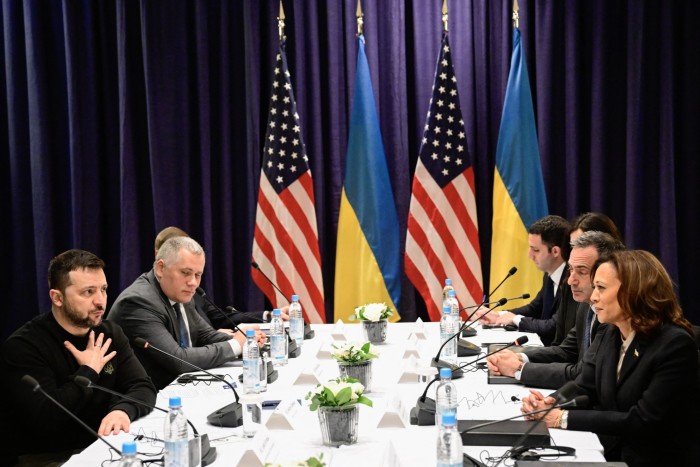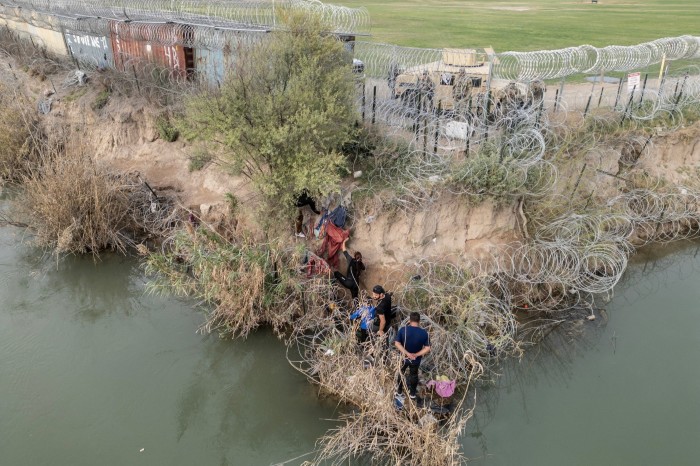
If vice-president Kamala Harris defeats Donald Trump in November, most of America’s allies will greet her victory with thinly veiled delight. “If she wins,” says an official from one of its long-standing Asian partners, “we will have a national holiday!” The official was barely joking, such are the worries in many capitals over the presumed unpredictability of a second Trump term.
Initial relief, however, over the prospect of a Harris administration would soon be followed by searching questions over her worldview and how it might differ from President Joe Biden’s. Her allies talk enthusiastically about how she, as America’s first post-baby boomer president, would bring fresh and “modern” thinking to America’s role in the world, and to a host of issues including the use of artificial intelligence and outer space for defence.
Her advisers also stress her doughty apprenticeship: in Biden’s four years in office she has met 150 heads of state, addressed the Munich Security Conference three times, and sat in on Biden’s key geopolitical telephone calls.
But she would come to the Oval Office with one of the least articulated visions of the world and America’s place in it of any incoming president in modern history. Partly because she entered the race late after the 81-year-old Biden stepped aside in July over concerns about his increasing frailty, and partly out of the caution of her campaign, there are just a few speeches by her to parse for clues into her thinking.
In the final month of campaigning in a tight race, Trump is seeking to paint the career prosecutor as too callow for a turbulent world. Her allies point to the hawkish note she struck in August when accepting her party’s presidential nomination. “I will ensure America always has the strongest, most lethal fighting force in the world,” she declared. The word “lethal” was all the more resonant given the traditional Republican charge that Democrats are “weak” on defence.

Beyond the public rhetoric, however, the contours of a philosophy are emerging. She is a “realist” or “pragmatist”, say people familiar with her thinking, though they add she bristles at being pigeonholed and likes to see herself as the consummate prosecutor probing propositions.
Like Biden — and indeed Trump — she would be instinctively cautious about deploying troops and reflexively standing by America’s post-1945 role as the world’s policeman. To understand a Harris foreign policy, says Patrick Gaspard, a former ambassador to South Africa who is now president of the liberal Center for American Progress think-tank and a veteran party strategist, you have to appreciate how Trump’s victory in 2016 turned American politics upside down and made it more inward-looking. It forced Democrats to tailor foreign policy far more to the concerns of ordinary people than was the case for much of the post-1945 era.
“Both parties used to say to voters, ‘You will eat the spinach of our trade deals.’ Well, Trump called time on that and said, ‘We won’t cut a single deal that isn’t about you,’” Gaspard says. “Harris would prioritise Main Street, and that affects how we would think about everything from climate to China. Unlike Trump, though, it would be a Main Street focus that isn’t about isolation.”
Allies of Harris insist she would not shrink from projecting force when America’s interests are under threat. “She understands you cannot protect America simply by shutting our doors and rolling up our tent,” says Senator Chris Murphy, a senior Democrat on the foreign relations committee.
In particular she would adhere to two pillars of Biden’s foreign policy — working with allies to prop up the battered foundations of the liberal international order, and maintaining pressure on Beijing via tariffs. However, she would stop short of seeking to “decouple” from China’s economy, allies say.
But there would be a shift of tone and trajectory, confidants say, highlighting her age, roots and upbringing. Harris, 59, is the child of immigrants — her mother was born in India and her father in Jamaica — and she was brought up in California where she became the state’s attorney-general.
“She is of a different generation and background to Biden,” says David Rothkopf, a foreign-policy analyst who has been advocating for her since long before July when she replaced the president as the Democrats’ candidate. “She is not a baby boomer. She is post-cold war; she started working in 1990. If Biden’s economic origin story is the rustbelt, hers is Silicon Valley.”
Such a shift could affect a range of issues including most sensitively the one that has consumed so much of Biden’s last year: the Middle East.
Since the foundation of Israel in war in 1948, adamantine support for it has been a foundation stone of American presidents’ foreign policy. Biden has been no different. Indeed one Democratic lawmaker sees him as “the most Zionist president ever”. But his staunch support has been increasingly questioned more widely in his party in the past year as the civilian death toll in Israel’s assault on Gaza has mounted.
Harris signalled this twice in speeches, expressing concern over the scale of Palestinian civilian suffering far more clearly and powerfully than Biden had done. This has led to speculation that as president she might be tougher on Israel than her boss.

“Joe Biden would say I remember talking to Golda Meir. In the Biden narrative, Israel and the Arab states were David and Goliath,” says Rothkopf. “But from the era of Obama onwards, Israel has been acknowledged as the strongest actor in the region and is often seen, as we know, as a bully or worse.”
Harris’s advisers make clear she would defend Israel — and its right to exist — to the hilt. After Iran’s ballistic missile barrage against Israel in early October she delivered a forthright statement condemning it.
As to whether she would ever follow in the footsteps of President George HW Bush who played one of America’s trump cards and withheld loan guarantees to Israel, this is seen as unlikely, not least given the attack by Iran. But one supportive lawmaker suggests that depending on how the situation develops she would probably turn up the pressure on Prime Minister Benjamin Netanyahu and might consider imposing sanctions on far-right cabinet members.
Advisers also suggest she might — after a potential long-awaited ceasefire in Gaza — push to resume the quest for a two-state solution. The Biden administration had in effect given up on this before last October’s devastating attack on Israel by Hamas, although since then their position has been all about the need for it for a durable peace.
“The vice-president has seen how costly this conflict has been . . . . first and foremost for the people of Gaza, for Israel and the region, but even in our own society,” says an aide, referring to the tensions on American campuses and more broadly. “On Israel and the Palestinians, she has said before that she doesn’t see it as a binary choice, to be pro-Israel or pro-Palestinian.”
Lawmakers who have worked with her say she would see the Israeli-Palestinian conflict as part of a broader puzzle, involving Arab states, in particular Saudi Arabia — as the Biden administration has. “It’s not a two-state solution, it’s a 23-state solution,” says Chris Coons, a Democratic senator who is one of the party’s leading voices on foreign affairs.
“I don’t think there’s any president that implements the prior president’s foreign policy wholesale,” says fellow Democratic senator Murphy carefully. “It’s likely she has departures from Biden’s foreign policy in the Middle East.”
When Harris suddenly went in July from being loyal vice-president to the Democrats’ champion, two conflicting arguments did the rounds in Europe as to what she might mean for the continent.
The first was that Biden would prove the last of the cold war era transatlanticists and that Harris, as a Californian who grew up looking west across the Pacific, could echo Barack Obama in consciously pivoting to Asia. The second was that because her national security adviser, Phil Gordon, is a noted Atlanticist she would remain wedded to Europe.

Both were misconstrued, people familiar with her thinking say. She would, they say, stay committed to the defence of Europe. But that would not be because of Gordon, who has an overarching “realist” worldview, in which Europe is just one part. Rather it would be because she believes in strengthening alliances, a core part of the Biden administration’s strategy.
On trade and geoeconomics though, transatlantic relations might be testier. EU officials are all too aware that while they are hoping for a Harris administration, it would, like a Trump presidency, pose difficult questions over their economic ties with China.
As for Ukraine, Harris has delivered robust speeches in support of Kyiv. She would continue to provide what it needs to be in a good position at a negotiating table, say people privy to her thinking, although officials in Kyiv believe she would follow the Biden policy in not allowing them to use American missiles to hit targets deep in Russia.
Barring a sudden reversal of Russian forces, she would not push for a swift settlement as Trump says he would do. “The vice-president believes that rewarding Russian aggression would send a message round the world that you can invade a country without paying the price,” says one aide.
But the mood in Washington has shifted in recent months as Russia has made advances on the battlefield. There is a widespread sense that a Harris administration would ultimately be in favour of negotiations and winding down the war, however difficult it might be to provide the requisite security guarantees to ensure Ukraine’s survival.

The failure of America and its allies to persuade much of the world to join them in backing Ukraine’s cause has underlined a recent phenomenon: the rise of so-called middle powers such as Brazil, South Africa and Indonesia who see an opportunity to play off America against China.
The Biden administration has been increasingly aware of the need to do more to win such countries over. But this has been undermined by what many in the global south see as America’s hypocrisy in condemning Russia while standing by Israel as it bombards Gaza.
Harris would intensify the courtship of non-aligned states, her allies say. This chimes with the thinking of David Lammy, Britain’s new foreign secretary, for whom improving ties with the global south is a priority. “We tend to focus on the conflicts in Gaza and the Ukraine,” he told the Financial Times. “But we could be talking about the conflict in Sudan or about Yemen.”
“As a philosophy of life she has always stood up for those who don’t have a seat at the table,” says a person familiar with Harris’s thinking. “Geopolitically, these are big and important countries with big populations that don’t always get adequately represented.”
Harris rejects the idea of seeing the world through the prism of a Manichean contest between democracies and autocracies, advisers suggest, and rather sees it like a lawyer: divided between rule-followers and rulebreakers. “She very much views the world in the prism of those who uphold international rules and norms and those who undermine them,” says an aide.

Senator Mark Warner, who worked with Harris on the Senate intelligence committee, says Harris has a “more nuanced understanding of the changing nature of the world”, which could help America’s quest to win over middle powers from China’s orbit.
“When we talk of America and the west we leave out the two-thirds of the world that I think would rather be with us because they see how draconian China and Russia are, and they know our technology is better,” he says. “I think she could bring a fresh voice in our approach to them.”
Of all the neuralgic issues a President Harris might be tempted to skirt, number one would surely be the southern border. Biden was seen to have handed her a poisoned chalice when he asked her to lead negotiations with the three “Northern Triangle” countries, Guatemala, Honduras and El Salvador, the source in recent decades of many of the migrants crossing the frontier. It has become a regular trope at Trump rallies to dismiss her as a failed “border tsar”.
And yet Venezuela, the oil-rich autocracy, which is home to many of the latest surge of migrants heading to America, would be a priority for Harris, allies say. The disputed election in July that returned President Nicolás Maduro to power threatens a fresh flood of refugees. “Venezuela will continue to require enormous attention,” says a person close to Harris’s thinking.

The Biden administration’s carrot-and-stick policy of lifting some sanctions on Maduro in return for his holding credible elections has failed. As a putative case study, Murphy highlights how Harris channelled public and private capital into shoring up the Northern Triangle economies, while tightening sanctions on their elites — although local business leaders suggest many of the deals Washington touts were already in train.
There are ways to apply pressure on Venezuela, not least by scrapping remaining exemptions to oil companies from sanctions, and lobbying the EU and UK to increase their sanctions on the elite. But effecting change will be immensely hard. “It is not easy to find a meaningful resolution to the situation in Venezuela,” says Warner. “But it is doable with focus and attention.”
If Harris wins she would preside at a time of wrenching change and have to navigate America’s way into the third post-second world war age. After the cold war, and then almost three decades of American primacy, an increasingly multipolar world is emerging.
Her senior appointments would be vital. National security experts suggest she might bring in seasoned figures who would see themselves as her peers, in contrast with Biden many of whose senior aides had long been in his circle. There have been few disagreements over policy, but some insiders argue he has not been challenged enough by his staff.
Ultimately, the key to her foreign policy as with all administrations would be “events”. Just about every president has taken office with a presumed set of assumptions and then been buffeted into a different course.
Remember Obama, says one national security veteran. In his first term he approved the “surge” of troops to Afghanistan. He ended up so wary of using American power in his second that he used the slogan “don’t do stupid shit” to sum up his approach.
Harris’s allies say she would harness the exciting opportunities of technology. She could expand spending on defence industries, they hint, looking at the potential of artificial intelligence and space for modern forms of defence. “She represents a new generation coming into power at the White House with perhaps a longer-term view,” says Murphy.
But whatever her vision, with wars in Ukraine and the Middle East, and other crises lying in wait, her challenge as ever in the Oval Office would be seeing beyond the daily brief.